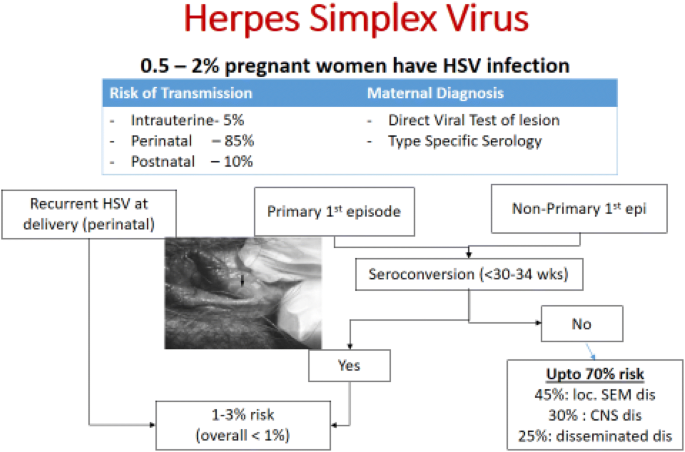
HSV-1 which usually causes cold sores or blisters around the mouth though it can be spread to the genital area during oral sex. Herpes is a lifelong infection without a cure though medications can help manage symptoms and outbreaks even during pregnancy.

This can happen if a person with a cold sore kisses the baby or even more rarely if the individual touches a cold sore and then touches the baby.
Hsv 1 during pregnancy. In response to these questions we summarize previous reports on herpes simplex virus 1 HSV-1 oral disease in pregnancy and briefly present 2 cases of primary gingivostomatitis in the first trimester of pregnancy resulting in a favourable outcome for both mother and infant. ACOG has updated the guidelines for management of genital herpes in pregnancy. HSV transmission is via direct contact with an incubation period of 2 to 12 days.
There are two types of HSV. Most cases genital herpes are caused by HSV-2. Genital herpes simplex virus HSV infection during pregnancy poses a risk to the developing fetus and newborn.
Genital herpes is common in the United States. Among 14- to 49-year-old females the prevalence of HSV-2 infection is 159. A primary or recurrent HSV-1 infection during labor is more easily transmitted to the infant but the disease is generally limited to the mouth eyes and mucous membranes.
Primary infection with HSV-2 is more likely to affect the central nervous system causing seizures meningitis developmental delay and death. Neonatal herpes may be caused by herpes simplex virus type 1 HSV-1 or herpes simplex virus type 2 HSV-2 as either viral type can cause genital herpes in the mother. Approximately 50 of neonatal herpes is due to HSV-1 and 50 due to HSV-25 Most cases of neonatal herpes occur as a result of.
Serologic studies of HSV-2 underestimate the prevalence of genital herpes because HSV-1 also causes genital disease. Among women with serologic test results that indicate susceptibility to HSV infection the incidence of new HSV-1 or HSV-2 infection during pregnancy is approximately 2. Similarly asymptomatic viral shedding is rare in genital HSV-1 infection.
The odds are very highly in your and your babys favor. Most neonatal herpes especially the serious cases occur when a woman acquires genital HSV infection during pregnancy especially during the last 2-3 months. The risk with recurrent herpes is very low.
Genital herpes is a sexually transmitted infection. This means that it can be passed along to another person through sexual contact. This includes genital sex oral sex and anal sex.
Pregnancy does not protect you from getting herpes. Im hoping that you may be able to answer a few questions about HSV 1 and preganancy and HSV 1 and childbirth as I seem to be reading conflicting information on other health advise sites or none at all for this particular kind of query I contracted HSV 1 two years ago from my ex partner after oral sex when he had a cold sore. I had a painful intitial outbreak in the genital area which.
Herpes is a lifelong infection without a cure though medications can help manage symptoms and outbreaks even during pregnancy. Herpes is caused by two types of the herpes simplex viruses HSV. HSV-1 which usually causes cold sores or blisters around the mouth though it can be spread to the genital area during oral sex.
Herpes Simplex Virus Infection in Pregnancy 1. Herpes simplex virus HSV is an ubiquitous enveloped and doublestranded DNA virus belonging to the. In recent years genital herpes has become an increasing common sexually transmitted infection.
Acyclovir is occasionally prescribed for pregnant women who suffer from extremely frequent outbreaks or those who acquire genital herpes during pregnancy. The use of acyclovir valacyclovir or famciclovir during pregnancy is not recommended by ACOG or approved for use during pregnancy by the Food and Drug Administration. HSV type 1 causes approximately one third to one half of neonatal herpes cases and up to 80 percent of new genital herpes infections among all women may be caused by HSV type 1.
HSV may be prominent during pregnancy due to relative maternal immunosuppression in pregnancy1 Most genital HSV infections primary non-primary recurrent are asymptomatic ie. Most mothers of infants with neonatal HSV disease were previously unaware of their own infection2. Women with no history of genital herpes whose partner has a history of cold sores generally HSV type 1 or genital herpes generally HSV type 2 should avoid oral vaginal and anal sex during the last 12 weeks of pregnancy.
Condoms are recommended during the entire pregnancy. Care of the baby after birth. If there is concern regarding possible.
For HSV-1 or oral herpes infection typically happens through contact from an infected persons lesion to a membrane area of the babys body such as the eyes or mouth. This can happen if a person with a cold sore kisses the baby or even more rarely if the individual touches a cold sore and then touches the baby. During pregnancy you should watch for symptoms of the virus becoming active such as tingling itching or burning around where the sore will eventually appear.
If you have a history of herpes or your blood test is positive your provider may prescribe an antiviral medication such as acyclovir Valtrex to reduce the risk of spreading the virus or having an outbreak around the time of your delivery.